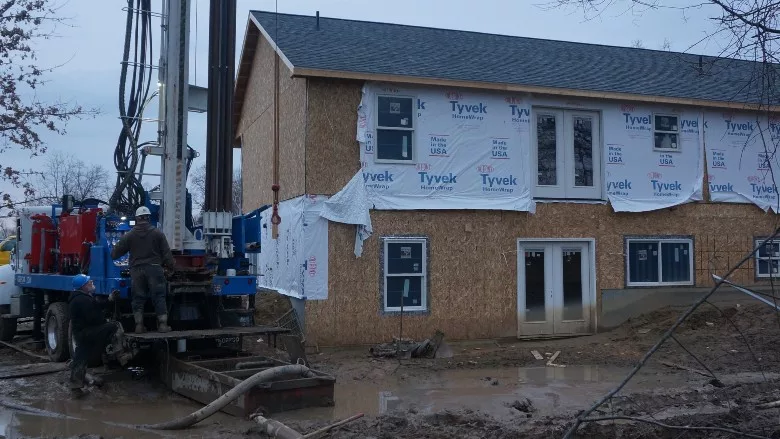Custom Builder Talks about Hiring Drillers as Subs
Tips for Well Drilling Companies Seeking Sub Contracts

A good relationship with a homebuilder can help water well companies get regular work on new builds.
Source: Brock Yordy
Drillers often have cause to sub for other trades. It can offer a good source of business whether you plug into a bigger pipeline job for cathodic, an HVAC contractor for geothermal or a custom home builder for water wells. Cameron Fox falls into that last category.
Fox owns Fox Custom Builders in Kalamazoo, Michigan. His company builds homes throughout west Michigan, and those homes often include a water well. Fox works with a range of subs, and offers some general advice.
“Ask a lot of questions,” he says. “You don’t know what you don’t know until you learn. You can always ask somebody, ‘Why are you doing it this way?’ Or, ‘Why would you approach the situation this way?’ It’s just always going to give you more insight into whatever you’re doing. You never know what you might learn that you can apply into a situation that could really help you out.”
Fox came on our Drilling In-Site video and podcast series to discuss subs and how drillers compare. This is an edited summary of our talk. Click here to see the full video, or here to listen to the podcast.
Q. Speaking from your finance background, how has your cost to build a home changed since 2020?
A. Mostly materials pricing and wages are up, which I don’t necessarily disagree with because I do think that there are a lot of trades that in the past, perhaps, they had a bigger wage gap than some of the others. So I do like seeing that kind of catchup. But, overall, as a home, prices are up. Everything’s kind of up, and it’s probably increased faster than the market wanted to see it. But there still is housing shortages and things like that in a lot of different markets around the country. People are going to pay that price and pay a little bit more of a premium for a new home.
Q. But give readers an idea. What did it cost to build an 1,800 square foot home in 2020 versus now?
A. It really depends. It depends on the size of the home. Obviously, the lumber is where most cost is incurred right up front. You know, 2020 you’re around $400, $500 a board-foot and now you’re $1,600. You can do the math there. An average home I’d say, your lumber packages are $20,000 to $30,000 more right off the bat, so that can accrue a significant cost — especially when you start doing larger homes, bigger truss systems, things like that. That cost adds up quite quickly.
Q. What have you seen the cost of having a well installed do during that same time?
A. It’s tough to say. We drill a lot of different areas, but I would say you’re probably 20%, 30% more. I think a lot of that is going to also be, your material prices have increased — just as everybody else’s has. Labor has probably a little bit increased as well, just as everybody else has. Then you have all of your materials, your pumps, everything like that. I think that’s going to be just a natural progression as well. That it’s just going to increase a little bit. It’s still only about, you know, 2% of your home’s actual total cost. In the grand scheme of things, it’s not a huge line item in the build process.
Q. How does that price cost look compared to other subcontractors like septic or HVAC?
A. I don’t think it’s increased as much. It has increased. Their materials and things have increased too. Wages have increased. I know several contractors were, you know, they kind of almost get in a bidding war to retain employees. So labor has gone up — especially journeyman, things at that level — and has been very competitive. … I don’t know if it’s even increased as much as some of the other trades, to be honest.
Q. As the builder, you’re the conductor in this situation. You work with several subs, so what do you look for in that business relationship? What sets a sub apart to where you think, “I’m going to do business with this person again”?
A. As a homebuilder, I can only know so much about each category. So, no matter what size of the home, I tend to try to use the same contractors over and over again. If I am vetting a new contractor or using somebody we probably haven’t used before or something like that, if that contractor is asking a lot of questions and has suggestions, that’s probably a contractor you want to work with because he’s not just looking at things for face value. He’s actually wanting to give input into the project, some insight into something maybe I don’t know or maybe I have overlooked. That’s really what you want to look for. You want to look for somebody that’s not just there to do the job, but wants to do the best job or help facilitate something before it’s a problem.
The Full Interview
We interviewed Cameron Fox of Fox Custom Builders for episode 43 of Drilling In-Site. See this and other conversations at www.thedriller.com/insite or listen to the podcast version at www.thedriller.com/insite-podcast. Also available in Apple’s Podcast store and Spotify.
Working on an interesting project or have industry wisdom to share? Email verduscoj@bnpmedia.com to be considered for a guest spot on Drilling In-Site.
Looking for a reprint of this article?
From high-res PDFs to custom plaques, order your copy today!




